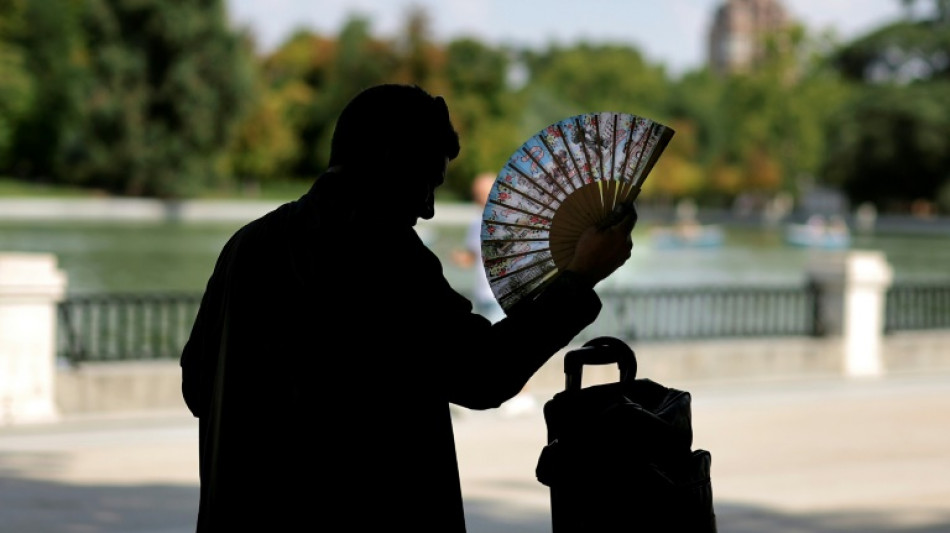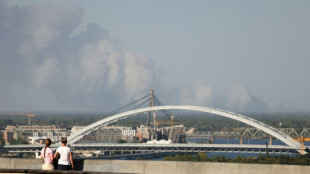
-
 Six face trial in Paris for blackmailing Paul Pogba
Six face trial in Paris for blackmailing Paul Pogba
-
Olympic champion An wins China crown in style

-
 It's party time for Las Vegas victor Russell on 'dream weekend'
It's party time for Las Vegas victor Russell on 'dream weekend'
-
Former Masters champion Reed seals dominant Hong Kong Open win

-
 Norris applauds 'deserved' champion Verstappen
Norris applauds 'deserved' champion Verstappen
-
Jaiswal and Kohli slam centuries as Australia stare at defeat

-
 Kohli blasts century as India declare against Australia
Kohli blasts century as India declare against Australia
-
Verstappen 'never thought' he'd win four world titles

-
 Former Masters champion Reed wins Hong Kong Open
Former Masters champion Reed wins Hong Kong Open
-
Awesome foursomes: Formula One's exclusive club of four-time world champions

-
 Smylie beats 'idol' Cameron Smith to win Australian PGA Championship
Smylie beats 'idol' Cameron Smith to win Australian PGA Championship
-
Five key races in Max Verstappen's 2024 title season

-
 Max Verstappen: Young, gifted and single-minded four-time F1 champion
Max Verstappen: Young, gifted and single-minded four-time F1 champion
-
'Star is born': From homeless to Test hero for India's Jaiswal

-
 Verstappen wins fourth consecutive Formula One world title
Verstappen wins fourth consecutive Formula One world title
-
Survivors, sniffing dogs join anti-mine march at Cambodia's Angkor Wat

-
 Far right eye breakthrough in Romania presidential vote
Far right eye breakthrough in Romania presidential vote
-
Jaiswal slams majestic 161 but Australia fight back in Perth

-
 Edinburgh's alternative tour guides show 'more real' side of city
Edinburgh's alternative tour guides show 'more real' side of city
-
IPL teams set to splash the cash at 'mega-auction' in Saudi Arabia

-
 Olympics in India a 'dream' facing many hurdles
Olympics in India a 'dream' facing many hurdles
-
Wounded Bangladesh protesters receive robotic helping hand

-
 Majestic Jaiswal 141 not out as India pile pain on Australia
Majestic Jaiswal 141 not out as India pile pain on Australia
-
Giannis, Lillard lead Bucks over Hornets as Spurs beat Warriors

-
 Juan Mata agent slammed as 'cowardly' by angry A-League coach
Juan Mata agent slammed as 'cowardly' by angry A-League coach
-
Marta inspires Orlando Pride to NWSL title

-
 Palestinian pottery sees revival in war-ravaged Gaza
Palestinian pottery sees revival in war-ravaged Gaza
-
Main points of the $300 billion climate deal

-
 Robertson wants policy change for overseas-based All Blacks
Robertson wants policy change for overseas-based All Blacks
-
Israel retreat helps rescuers heal from October 7 attack

-
 Afghan women turn to entrepreneurship under Taliban
Afghan women turn to entrepreneurship under Taliban
-
Mounting economic costs of India's killer smog

-
 At climate talks, painstaking diplomacy and then anger
At climate talks, painstaking diplomacy and then anger
-
Uruguayans head to polls with left hoping for comeback

-
 Trump's mass deportation plan could end up hurting economic growth
Trump's mass deportation plan could end up hurting economic growth
-
Iran director in exile says 'bittersweet' to rep Germany at Oscars

-
 US consumers to bargain hunt in annual 'Black Friday' spree
US consumers to bargain hunt in annual 'Black Friday' spree
-
Cheers, angst as US nuclear plant Three Mile Island to reopen

-
 Scientists seek miracle pill to stop methane cow burps
Scientists seek miracle pill to stop methane cow burps
-
Australia ditches plans to fine tech giants for misinformation

-
 Developing nations slam 'paltry' $300 bn climate deal
Developing nations slam 'paltry' $300 bn climate deal
-
Red Bulls win 'Hudson River derby' to reach conference final

-
 Neuville wins world title after Tanak crashes at Rally Japan
Neuville wins world title after Tanak crashes at Rally Japan
-
Neuville wins world rally title after Tanak crashes in Japan

-
 Colapinto cleared for Las Vegas GP despite heavy crash
Colapinto cleared for Las Vegas GP despite heavy crash
-
'Smiling One' Amorim vows he has ruthless streak Man Utd need

-
 Marseille down Lens to stay in touch with Ligue 1 leaders, Lyon draw
Marseille down Lens to stay in touch with Ligue 1 leaders, Lyon draw
-
New Zealand beat 'proud' Italy in Cane's Test farewell

-
 Barca collapse in Celta draw without Yamal, Simeone hits milestone
Barca collapse in Celta draw without Yamal, Simeone hits milestone
-
Thailand's Jeeno equals Yin for lead at LPGA Tour Championship


During a heatwave, temperatures not the only threat: expert
Spain has just emerged from a 21-day heatwave that engulfed Madrid, Barcelona and Zaragoza, posing a health threat which extends far beyond the actual temperature, according to Julio Diaz, a researcher at Madrid's Carlos III Health Institute.
- Isn't heat what kills during a heatwave? -
"The impact of heat on health is far more than just temperature... its effect can be felt across income levels, age groups, socio-economic conditions, healthcare, and different cultural approaches to heat," says Diaz.
"We divided Spain into 182 regions... and in each one, we worked out the temperature at which people start to die as a result of the heat. In Seville, 40 degrees Celsius (104 Fahrenheit) is not even classed as a heatwave, whereas in A Coruna (in northwestern Spain), the temperature which defines a heatwave is 26 degrees.
"When there is a heatwave, only 3.0 percent of mortality is due to heat stroke. Heat kills by aggravating other illnesses."
- Why are the first heatwaves the most deadly? -
"In the first heatwave (of the year) much more people are likely to be susceptible (to death) than the second because it claims the frailest, leaving fewer susceptible people in the second and fewer still in the third... That's why the first heatwave always has a greater impact on mortality. This is what in epidemiology we call the 'harvest effect'."
- Why are living standards a factor? -
"It's clear that the impact of heat is much greater in poorer neighbourhoods.
"It is not the same thing to experience a heatwave in a room with three people and one window and no air conditioning or fan, than going through the same thing in a villa with a swimming pool.
It's not even a question of having air conditioning or not, but about being able to turn it on. During this heatwave, the price of electricity in Spain skyrocketed."
- What is heatstroke? -
"Heatstroke happens when a person is exposed to high temperatures... and their body is not able to regulate that temperature. If you go out in the sun at 42C or exercise at those temperatures, your body is unable -- no matter how much it sweats, which is the main mechanism for regulating heat -- to lower and maintain its temperature at 37C.
When your body is no longer at 37C... your organs stop working properly, including your brain. Then hyperthermia sets in and the person can die."
- What is 'heat culture'? -
"In 2003, Europe suffered a brutal heatwave and 70,000 people died in 15 days. People were not prepared, and there were no prevention plans, which meant it had a brutal impact on mortality. Now nobody doubts that heat kills.
But people adapt. Between 1983 to 2003, for every degree above the temperature classed as a heatwave, the mortality in Spain increased by 14 percent. But after 2003, it barely increased by three percent.
In a city like Madrid, you never used to see older people wearing shorts but nowadays they all wear them -- you see them going out for a walk wearing a hat and with a bottle of water.
In places where they are used to having heatwaves, there are now much more air conditioning units and secondly, homes are much more adapted to cope with this heat.
People don't go out from 3:00 pm, that's why the siesta exists in Spain. And in the southern Andalusia region, the villages are painted white and the streets are wide so the wind can freely circulate."
Y.Bouchard--BTB



